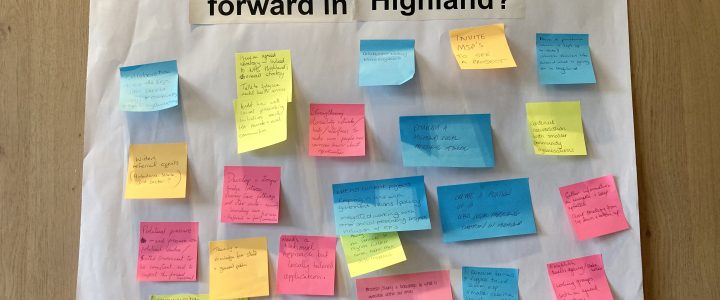Over the last eighteen months, Museums & Heritage Highland have been part of an innovative project looking at the role heritage and culture can play in supporting social prescribing for people in the Highlands.
Social prescribing, sometimes referred to as community referral is a means of enabling GPs , nurses and other health and care professionals to refer people to a range of local, non-clinical services. It is an approach that connects people to activities, groups, and services in their community to meet the practical, social and emotional needs that affect their health and wellbeing.
Museums & Heritage Highland partnered with Highlife Highland to work with University of the Highlands & Islands leading the research, funded by UKRI (UK Research and Innovation). It was shaped by a project first devised and run in Edinburgh by Ruthanne Baxter, Museum Services Manager at Edinburgh University Museums. Her initiative, Prescribe Culture, was a heritage-based, non-clinical pilot project with the aim of supporting students at Edinburgh University with mental health difficulties. By working with Ruthanne and her expertise, Prescribe Heritage Highland aimed to look at whether, and how, this approach could be scaled up in rural areas to support people across the Highlands. Five of our museums, Groam House Museum, Wick Heritage, West Highland Museum, Clyne Heritage Society and Highland Museum of Childhood were project partners, working alongside Highlife Highland Museums, Archives & Rangers Services. Each museum devised a programme of activity designed over six weeks for participants to attend.
From a research perspective, the project has been really interesting. The project faced challenges around perceptions of what ‘social prescribing’ means and its value to patients. The referral process and how GPs actually signposted their patients into the museums’ activity programmes was also highlighted as a barrier to participation.
We know that our museums in the Highlands deliver what would be defined as ‘social prescribing’ on micro levels all the time. From the volunteers who work in our museums benefiting from making social connections, to people engaging with our events, activities and projects that encourage meeting new people and improving wellbeing, our museums really are communities of care.
This project has allowed us to begin to find ways of measuring the impact our museums have in our local communities and show the difference they make to peoples’ lives. We hope that a further phase of funding will allow the findings of this project to be developed into new community collaborative initiatives. A short film was made, exploring the successes and challenges of delivering social prescribing in rural environments.

